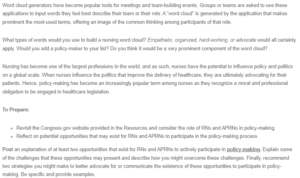The Role of the RN/APRN in Policy-Making
RNs (Registered Nurses) and APRNs (Advanced Practice Registered Nurses) have important roles in shaping healthcare policies. They can actively participate in policy-making through various avenues, and while these opportunities are significant, they also come with challenges. One opportunity for RNs and APRNs is to engage with professional nursing associations. These organizations often have advocacy arms that influence local, state, and national healthcare policies. For example, the American Nurses Association (ANA) and the American Association of Nurse Practitioners (AANP) regularly advocate policy (Myers, 2020). The challenge here is that many nurses may need to be made aware of these opportunities or feel overwhelmed by the bureaucratic nature of policy work. To overcome this challenge, nursing schools and healthcare institutions can provide workshops and seminars on healthcare policy advocacy (Schaeffer & Haebler, 2019). Creating accessible online platforms for nurses to access information and participate in policy discussions can facilitate engagement.
Another opportunity lies in participating in legislative committees and advisory boards related to healthcare. Serving on these platforms allows RNs and APRNs to provide their clinical expertise and perspectives on proposed policies (Myers, 2020). However, the challenge here is the competitive nature of such appointments and the perception that healthcare professionals may need to gain the necessary background in policy development. To address this challenge, nurses can seek mentorship from experienced nursing policy advocates who have successfully served on such committees (Milstead & Short, 2019). Moreover, universities and nursing programs could encourage students to pursue policy-focused education, such as dual degrees in nursing and public health or healthcare administration.
To better advocate for and communicate these opportunities, educational institutions should incorporate policy advocacy courses into their curricula, educating nursing students on the importance of policy involvement and providing them with the means to do so (Milstead & Short, 2019). Furthermore, mentorship programs should be developed to connect experienced nurse advocates with those interested in policy work, helping them navigate the world of policy-making effectively.
In conclusion, RNs and APRNs can significantly impact healthcare policy-making. The key lies in identifying these opportunities, overcoming the associated challenges through education and mentorship, and advocating for these opportunities through formal education and mentorship programs (Schaeffer & Haebler, 2019). By actively participating in policy development, nurses can ensure that healthcare policies are informed by their practical knowledge, leading to more effective and patient-centered healthcare systems.
References
Milstead, J. A., & Short, N. M. (2019). Health policy and politics: A nurse’s guide (6th ed.). Jones & Bartlett Learning
Myers, C. R. (2020). Promoting population health: Nurse advocacy, policy making, and use of media. Nursing Clinics, 55(1), 11-20. https://doi.org/10.1016/j.cnur.2019.11.001
Schaeffer, R., & Haebler, J. (2019). Nurse leaders: extending your policy influence. Nurse Leader, 17(4), 340-343. https://doi.org/10.1016/j.mnl.2019.05.010
ORDER A PLAGIARISM-FREE PAPER HERE
We’ll write everything from scratch
Question

The Role of the RN APRN in Policy-Making
Word cloud generators have become popular tools for meetings and team-building events. Groups or teams are asked to use these applications to input words they feel best describe their team or their role. A “word cloud” is generated by the application that makes prominent the most-used terms, offering an image of the common thinking among participants of that role.
What types of words would you use to build a nursing word cloud? Empathetic, organized, hard-working, or advocate would all certainly apply. Would you add a policy-maker to your list? Do you think it would be a very prominent component of the word cloud?
Nursing has become one of the largest professions in the world, and as such, nurses have the potential to influence policy and politics on a global scale. When nurses influence the politics that improve the delivery of healthcare, they are ultimately advocating for their patients. Hence, policy-making has become an increasingly popular term among nurses as they recognize a moral and professional obligation to be engaged in healthcare legislation.
To Prepare:
- Revisit the Congress.gov website provided in the Resources and consider the role of RNs and APRNs in policy-making.
- Reflect on potential opportunities that may exist for RNs and APRNs to participate in the policy-making process.
Post an explanation of at least two opportunities that exist for RNs and APRNs to actively participate in policy-making. Explain some of the challenges that these opportunities may present and describe how you might overcome these challenges. Finally, recommend two strategies you might make to better advocate for or communicate the existence of these opportunities to participate in policy-making. Be specific and provide examples.

